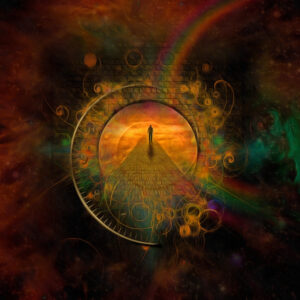Making Sense of Spiritual Beliefs, Part I

“Nothing is so firmly believed as that which we least know.”
― Michel de Montaigne, The Complete Essays
In the last issue of this newsletter I wrote about the concept of Belief and discussed some of the reasons why we believe what we do. One of the major take-aways was the idea that our belief systems define for us what sort of a universe we live in; what makes sense, and what doesn’t; where meaning is to be found.
Spiritual belief systems uniquely illustrate how beliefs work in our lives because they are explicit statements of our personal philosophy; our views about the nature of the universe and of our place within it. Taking that conclusion as a starting point, my ongoing inquiry has been focused in recent days on the nature of spiritual beliefs.
In this Newsletter, Part I of two, I try to define clearly what “spiritual” means. Then, in Part II, I will unpack the essential elements of a spiritual world view.
Spirituality can be defined as the quest for ultimate or sacred meaning or purpose in life. In my view, spirituality arises as a result of our hard-wired search for meaning[i]. The use of a verb, to quest or to seek, denotes that there is action—dynamic process— involved. We call that action spiritual practice. There are a myriad of different forms of spiritual practice, including meditation, contemplation, and prayer. Regardless of the form of practice, the important point is that spirituality is a quest for meaning; the desire to find what is true.
A somewhat separate but related point is that spirituality is not fundamentally about what we believe, but is, rather, a dimension of subjective experience. Although we can (and do) clothe our spiritual experiences in beliefs of one sort or another, the more important thing is the naked quality of subjectivity that lies beneath.
Similar points are discussed at length by Buddhist scholar Stephen Batchelor in his book Buddhism Without Beliefs[ii], which the interested reader may find useful. As Batchelor puts it, the Buddha didn’t give us something to believe in, but rather something to do. Underscoring the idea that Belief is beside the point in spiritual practice, Batchelor reminds us that the Buddha was not a mystic. The central guidance in Buddhism is to look not towards belief but towards the wisdom that can be found within.
In this frame of reference, spiritual beliefs can be viewed as simply one important variety of story that human beings like to tell. Human beings have the proclivity to make stories about the world. Our spiritual beliefs are narratives that explain to us what otherwise we do not know how to explain. They describe unseen forces at play in determining the world of lived experience.
Spiritual practice takes us into the depths of the inner world. The idea of the holy grail captures the essence of the quest: entering the forest at its darkest point and groping one’s way forward to the truth. We undertake this journey alone, and we leave everything, including our personal views, behind.
What happens in the process then becomes part of our story about the true nature of the universe. Story-telling infuses every aspect of human existence. In no way do I mean to imply that spiritual beliefs are merely stories; nor that what we believe is in any way insignificant. As I have discussed in the previous Newsletter and elsewhere, belief systems are part of the basic matrix for what comes into being.
Beliefs are like the cage we place around a young, growing plant that shapes how it will grow.
As the consciousness pioneer John Lilly said back in the day (1975), “what we believe either is true or becomes true, within certain limits to be determined experimentally and experientially. In the province of the mind, there are no limits” [iii] .
Although spiritual world view can be described in these abstract and transpersonal terms, every spiritual experience arises in the context of someone’s very particular world. People vary greatly in their spiritual practice, in the spiritual experiences they have, and in the beliefs that they hold. How we make sense of spiritual experience — of any experience we have— reflects complex forces at play in the human mind and brain.
Because our human minds are relationally organized, spiritual experiences are often construed in relational terms. For instance, some people live in a subjective world populated by disembodied entities, some of which are experienced as helpful (personified as angels or spirit guides, the archetypal benevolent or parental other), and others of which may be felt to be malevolent (ghosts or demons, imago of punitive or abandoning other). One common example is the idea of the “pain body”, posited by spiritual teacher Eckhart Tolle as an explanation for afflictive emotions. A commonly held belief which represents the relational imprint in more abstract terms is that “the universe” arranges for what happens to us as a lesson that “it” is trying to teach us. The variations are endless. How we make sense of our spiritual experience is influenced by our psychodynamics.
My hope is that the reader might be inspired by these reflections to inquire deeply about their own spiritual beliefs. As I have said previously, a belief is not ‘the truth’. What we believe is what we take to be true. However, beliefs relate as much to our subjective views as to what’s really there.
That said, it is not always easy to recognize belief as belief. Without recognizing it, we can elevate our beliefs to the level of truths. We need to ask the question, is this idea I have truth or belief?
One of the goals in engaging an inquiry about your beliefs is to sort out the difference. Sometimes we can cut through confusion by asking the question how do I know this is true?
Even granting the possibility that something we “know” is not an absolute certainty creates a new perspective, a new openness. This openness of mind, this not-knowing, is what spiritual practice is ultimately about.
******************
[i] Victor Frankl (1959; 2006) Man’s Search for Meaning. Beacon Press, Boston.
[ii] Batchelor (1997) Buddhism Without Beliefs. Riverhead Books, NY
[iii]John Lilly (1975) Simulations of God: The Science of Belief. Bantam Books, NY
